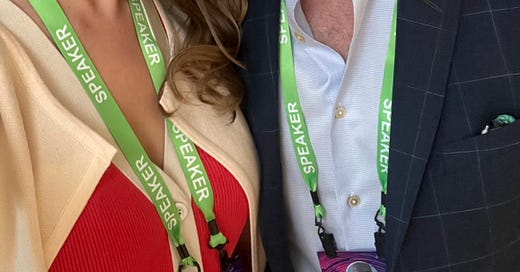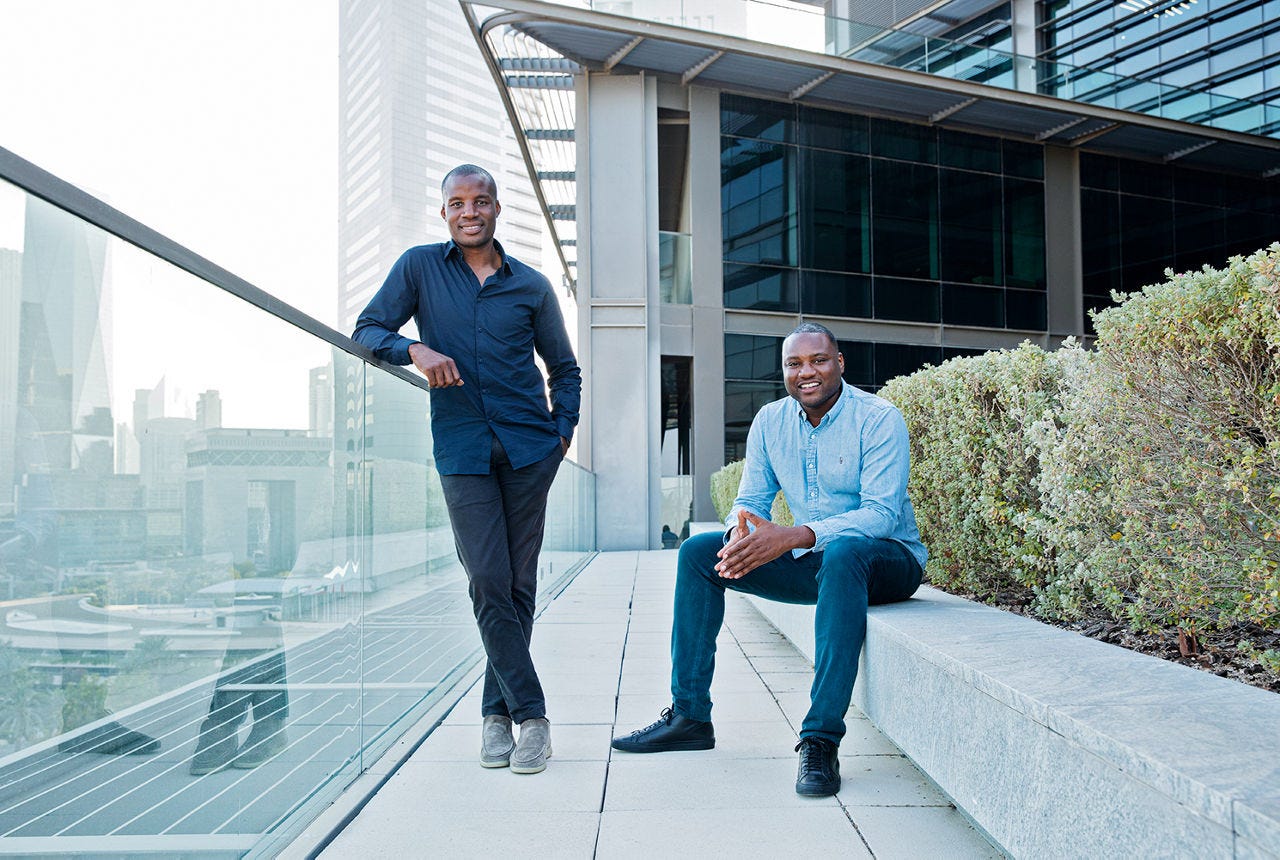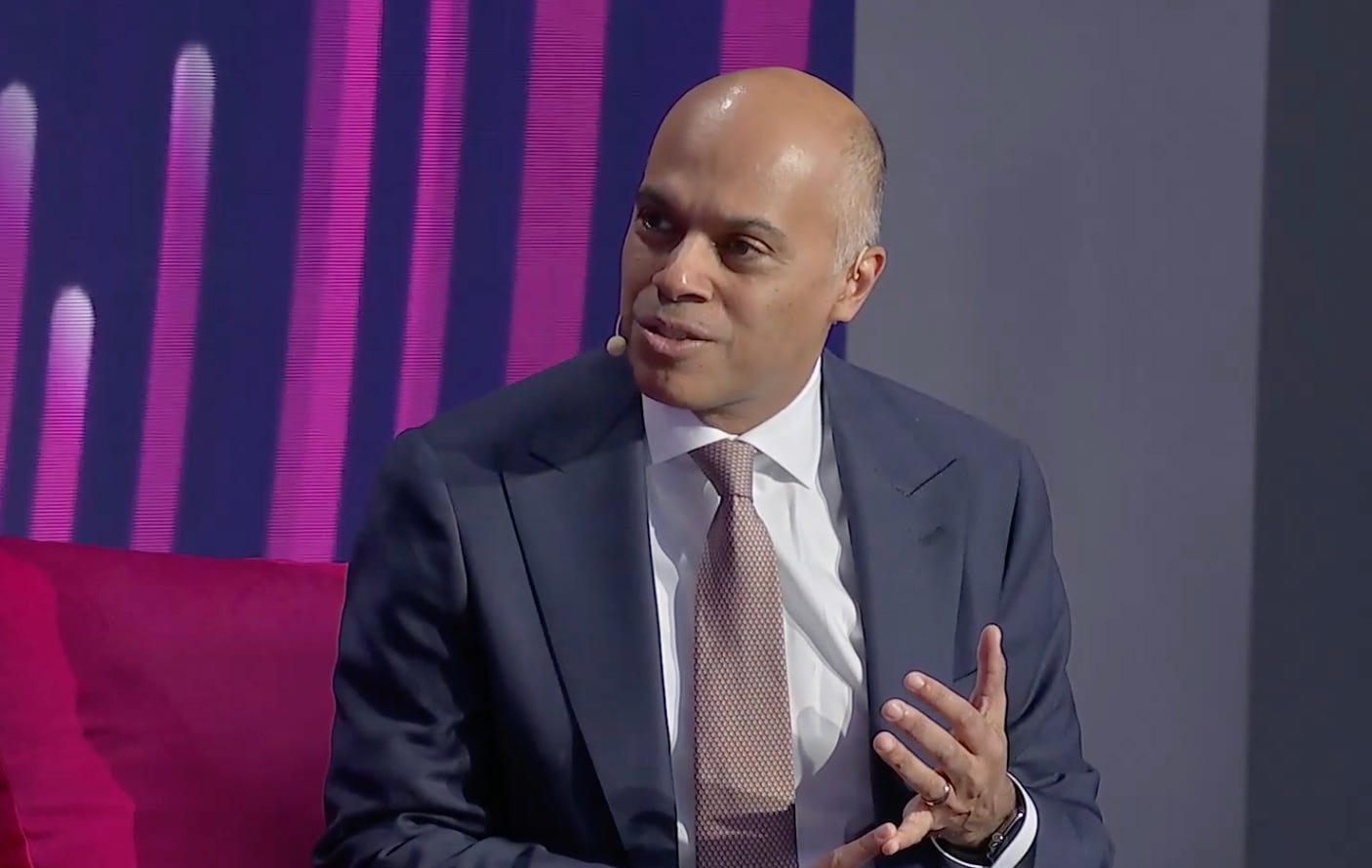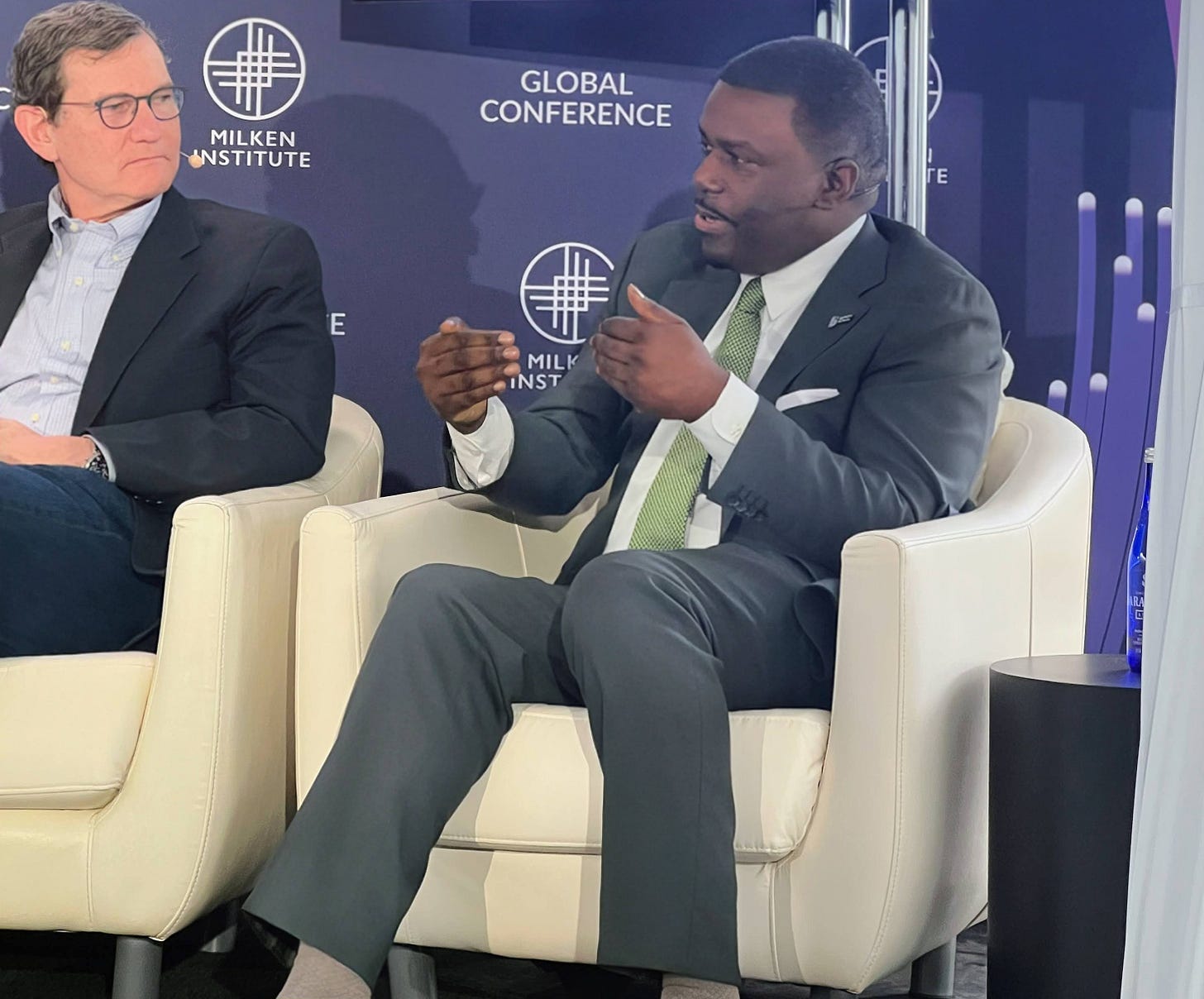The Milken Institute 2025: The Race to Preserve Humanity
The latest insights from the 2025 Milken Institute Global Conference
Last week at the Milken Institute Global Conference, two massive forces shaped every conversation: the shifting global power dynamics and AI's impact on business. But what really stood out wasn't the disruption—it was everyone's focus on preserving what makes us human.
The same questions surfaced across sessions on education, media, fintech, luxury, and workforce transformation: How do we build trust? How do we create real connections? How do we ensure everyone has opportunities? How do we protect our collective well-being?
These aren't side issues anymore. They've become the primary strategy driving innovation everywhere. As the world transforms around us, what we protect and nurture matters more than ever.
Here are five areas where I witnessed this race to preserve humanity playing out in real time:
1. The Access Revolution: Fintech's War on Gatekeepers
As currencies collapse, inflation soars, and economic chaos spreads globally, fintech innovators are focusing on something bigger than disruption—they're making financial systems work for the billions who've been locked out. The conversations at Milken revealed how technology can expand human opportunity rather than constrict it.
Matt Oppenheimer's Remitly now moves $50 billion annually, slashing remittance costs from 15% to just 2.5% in a $2 trillion global market—revealing how technology can preserve human connection across borders.
Jalak Jobanputra shared that stablecoins now process more transactions worldwide than Visa and Mastercard combined—providing stability in volatile economies where traditional financial institutions have failed.
I had to research this myself to believe it: Stablecoins surpass Visa and Mastercard with $27.6 trillion transfer volume in 2024 (Visa and Mastercard combined $25 trillion). If you also consider cross-border payments, stablecoin usage has already jumped tenfold since 2020, hitting $2.5 trillion a year.
Perhaps most revealing was Ladi Delano's Moove, which tackles a crisis he sees across continents. "Youth unemployment is something I don't think a lot of people talk about," he explained. "When you look at the continent of Africa, 70% of our population are below the age of 35, yet we struggle to create jobs for all of the young individuals." His solution uses AI to analyze ride-hailing data for credit assessment. Starting with just 76 cars in Nigeria, they've expanded to 40,000 vehicles across 20 cities—demonstrating that billions were excluded not from lack of creditworthiness, but from lack of visible data in legacy systems.
But Delano isn't stopping there. Moove's new partnership with Waymo is transforming their entire model: "We're empowering individuals to move from drivers to fleet owners and ultimately, business owners," he explained. Instead of driving one car, people will manage fleets of autonomous vehicles in their communities, creating a pathway from employment to entrepreneurship.
Ashley Bell (above), founder of Redemption Bank with early-stage support by Dr. Bernice A. King, articulated the human stakes with blunt clarity: "Credit scores are a monopoly. It's impossible to believe that 54% of African Americans should not be trusted to own homes. We have to denounce that system and find something better." His solution: a fully digital bank that evaluates creditworthiness based on rent history and actual payment patterns rather than traditional scores.
The fintech leaders preserving humanity amid financial disruption are:
Recognizing data patterns that humanize rather than dehumanize
Creating direct pathways to asset ownership and wealth creation
Building tools that serve communities rather than extract from them
Ensuring technology expands rather than restricts human potential
In a financial landscape being reshaped by both geopolitical tensions and AI capabilities, the north star remains clear: use technology to expand human opportunity rather than constrain it.
2. Media’s Trust Reckoning: Proximity + Discernment over Algos
The geopolitical stakes of trusted information have never been higher in an information landscape defined by algorithmic amplification and deliberate disinformation. At Milken, I witnessed how media leaders are responding: they are getting closer, going niche, and providing genuine human discernment.
Oliver Darcy has built Status Media to 80,000 subscribers by focusing on one thing: trust. "People are very interested to know what is going on in these power corridors," he explained, "because they realize that it impacts how information is distributed, how culture is shaped." His success proves that audiences will pay for human-interpreted insights over algorithmic feeds.
Jessica Yellin, former CNN White House correspondent, takes it even further with News Not Noise (substack!). "I do hand-to-hand combat all day with disinformation on my phone," she told the audience, describing her work for 1.5 million followers. "The truth is not dead. There is a massive audience that wants trusted information." Her approach demonstrates that human judgment remains our most effective filter in an age of information warfare.
The revelation? Trust can't be algorithmically manufactured, only humanly cultivated. Kevin Merida, former executive editor of the Los Angeles Times, emphasized what truly matters: rebuilding "our local news ecosystem" where journalism is directly accountable to real communities it serves.
What's emerging are what I call "trust zones" characterized by:
Direct, accountable relationships between information providers and recipients
Human curators who filter the noise that algorithms often amplify
Community-level accountability that prevents remote exploitation
Consistency that builds pattern recognition in a chaotic landscape
As Leanne Caldwell (formerly of NBC News and Washington Post, now at Puck) observed: "The media is becoming more and more fragmented... Each media outlet does not need to be everything." In a world of information warfare, the north star is clear: restore trusted proximity between those who provide information and those who depend on it.
3. The Dignity Imperative: Luxury's Identity Crisis
As geopolitical tensions reshape global markets and AI commodifies what was previously exclusive, luxury leaders are rediscovering an essential truth: true luxury was never about price points or scarcity—it was always about human dignity and emotional connection.
Ian Schrager (above), the visionary behind Studio 54 and boutique hotels, cut through the noise: "Luxury has nothing to do with wealth or financial capabilities. It's just about the way you treat someone." This insight reveals that as AI makes automated experiences ubiquitous, what distinguishes luxury isn't algorithmic personalization but authentic human recognition.
Architect Thomas Heatherwick (above), whose studio designed New York's Little Island, highlighted our collective challenge: "We've created unhuman places. Every one of the 8 billion people on the planet thinks they're special, but we've had environments that haven't treated us as special." As geopolitical tensions and digital technology drive us into increasingly separate realities, the poverty of our shared physical environments becomes impossible to ignore.
Anish Melwani, CEO of LVMH U.S, distilled luxury to its essence: "Luxury is connected to the underlying human emotion of accomplishment." This reveals that in an AI-driven world, luxury's value lies not in exclusivity but in its capacity to recognize and honor human achievement.
The luxury providers preserving humanity amid disruption are:
Designing environments that honor human dignity rather than signaling status
Creating spaces for genuine connection rather than digital isolation
Understanding that accomplishment feels different for different people
Recognizing that human recognition cannot be algorithmically replicated
In a luxury landscape being transformed by both geopolitical realignment and technological capability, the north star remains clear: honor human dignity in ways that technology alone cannot.
4. The Great Unbundling: Education's Existential Moment
The education panel delivered a powerful insight through Juan Sánchez Muñoz, President of the University of Houston: "The whole idea of higher education is learning how to learn."
This simple statement sparked a deeper conversation about education's future. ETS CEO Amit Sevak pushed it further, arguing that universities need to evolve: "We need systematic, measurable outcomes across dimensions, similar to healthcare and finance." His point was clear—education must prove its ROI to students and society on career readiness, financial security, and civic engagement.
Lisa Gevelber, CMO of Google Americas, offered a practical solution already in motion. "Having a college degree is life-changing," she acknowledged, "but we believed it shouldn't be the only way to change your life." Google Grow’s career certificates in cybersecurity and data analytics are now in community colleges nationwide, bypassing the four-year degree gatekeeping entirely.
Meanwhile, CodePath's Michael Ellison showed how AI is already changing the game— decreased coding training costs by 30% while improving outcomes by using AI to personalize education at scale, proving we never needed the bureaucratic weight of traditional systems to deliver quality learning.
But it was Artis Stevens from Big Brothers Big Sisters who reminded us of education's heart. His research proves that mentorship drives both personal growth and economic mobility, with programs that "contribute to a more skilled and competitive workforce and add value to local economies."
The message was clear: As AI handles information processing, education's true value lies in human connection, judgment, and creating direct paths to opportunity.
5. AI: Redefining Work, Not Replacing Workers
With headlines announcing layoffs at Google and Meta while these companies redirect resources toward AI talent, it's clear we're witnessing not isolated shifts but a fundamental restructuring of work itself.
By 2030, according to the WEF Future of Jobs Report, 22% of jobs will transform, 170 million new roles will emerge, and 40% of skills will evolve. But the patterns emerging suggest something more fundamental:
Work is evolving toward higher-order human capabilities. Francis DeSouza of Google Cloud highlighted this shift: "Our role in planning, managing, orchestrating, is going to become much more important." What's emerging isn't the elimination of human work, but its elevation to tasks that require uniquely human judgment.
Value is being correctly reassigned to human discernment. Kara Stein, former SEC Commissioner, articulated what technology alone cannot replicate: "Technology is a tool that can enhance, but cannot replace, professional skepticism and professional judgment." What's emerging isn't the death of expertise, but its liberation from administrative burden.
Power is being / (can be) redistributed more equitably. Francis DeSouza, shared striking data: "We're seeing a proliferation with 2 billion AI interactions in workspace every month, a lot of that is driven by small businesses that are using AI." This isn't just about efficiency—it's a fundamental redistribution of capability to previously disadvantaged players in the global economy.
Arianna Huffington captured the ultimate imperative: "Let AI be more intelligent, and let humans become wiser."
In the race between nations and corporations to harness AI, the north star must remain clear: free human capacity for the judgment, creativity, and connection that technology alone cannot provide.
What We Protect Now Defines Our Future
The most striking revelation from Milken wasn't about the magnitude of change—we already knew that. What became clear is that we're witnessing a fundamental recalibration in how we build trust, how we learn, how we access and grant opportunities, and how we experience work and liberate our ideas.
The leaders making the greatest impact weren't just adapting to change—they were reimagining our most basic human systems:
Trust through proximity, not platforms. Oliver Darcy and Jessica Yellin aren't building bigger audiences—they're building closer ones. When trust can't be algorithmic, it must be intimate.
Learning through relationships, not isolation. As Big Brothers Big Sisters proved and Google's career certificates demonstrate alongside traditional degrees, the future of education is collaborative. It's about mentorship, community, and creating multiple pathways to knowledge and opportunity.
Access through innovation, not permission. Ladi Delano's drivers don't need traditional credit scores. Ashley Bell's customers don't need perfect financial histories. The revolution is bypassing gatekeepers entirely.
Liberation through partnership, not automation. As Francis DeSouza revealed, AI isn't replacing human work—it's freeing 2 billion monthly interactions so small businesses can compete with giants. The choice is whether we become partners with AI or prisoners to it.
This recalibration isn't just reshaping industries—it's redefining what it means to be human in an AI age. The future won't belong to those with the most advanced technology or strongest economies, but to those who understand this fundamental shift and act on it.
I'd love to hear your thoughts. What are you choosing to protect in your industry? What vision guides your decisions amid these transformations?
Curiosity is contagious; if you like this newsletter, please share it!!
Penned by Libby Rodney and Abbey Lunney, founders of the Thought Leadership Group at The Harris Poll. To learn more about the Thought Leadership Practice, just contact one of us or find out more here.

















